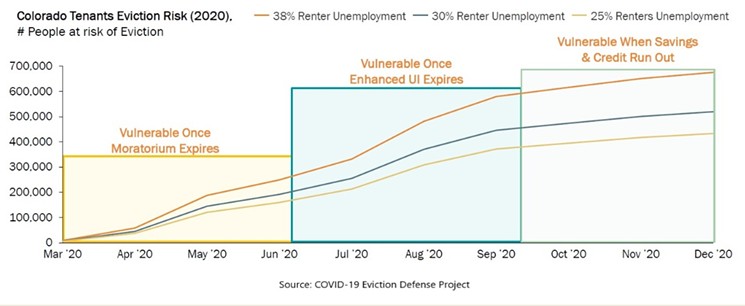A new study contends that more than 400,000 people in Colorado could be at risk of eviction through the fall of 2020 — a potential economic and humanitarian cataclysm that forthcoming legislation will try to prevent before June 13, when a temporary extension of an eviction moratorium put in place by Governor Jared Polis is set to expire.
The analysis was assembled by Sam Gilman and past Westword profile subject Marco Dorado on behalf of the Colorado Eviction Defense Project (CEDP), whose co-founder, Zach Neumann, notes that a worst-case scenario could result in a fiscal crisis capable of dogging vulnerable people for years to come. In his words, "tenants might owe nearly $800 million in rental debt," in addition to losing the roof over their head.
The modeling created to make these predictions is complex, breaking Coloradans into categories based on income, among other distinctions, and weighing prospects such as enhanced unemployment insurance and stimulus funding from the federal government. But then, Neumann says, "It does something really simple: It predicts when they run out of money based on a family finance bucket. So if you're undocumented and you don't have access to expanded UI or stimulus money, the risk attaches sooner, and if you have savings and access to credit, and housing and food expenses are a smaller percentage of your income, the risk attaches later."
Still, everyone included in the model "eventually runs out of money, assuming federal benefits end in July," Neumann adds.
Such a scenario is already looming. The Bell Policy Center cites a U.S. Census Bureau report from May stating that 15 percent of Coloradans, or an estimated 520,000 people, "either missed their rent or mortgage payment or have slight or no confidence that their household can pay next month's rent or mortgage on time." Moreover, the University of Chicago recently estimated that "42 percent of coronavirus-related job losses will result in permanent job losses."
Against this backdrop, the CEDP study calculates that nearly 420,000 Coloradans representing 181,000 households will be at risk of eviction by September as a result of accumulated debt totaling around $765 million. Among the most endangered will be communities of color, undocumented individuals and low-income families.
This graphic offers estimates based on unemployment figures among renters of 25 percent, 30 percent and 38 percent:
The eviction orders put in place by Polis have kept the wolves from many doors thus far, but Neumann says he fears that's about to end.
"The initial moratorium lasted for thirty days, but it expired at the end of May," he explains. "The governor issued a fifteen-day extension that continues through mid-June, but it has more narrow protections for tenants. In the prior version, basically everyone was protected from eviction. But the new moratorium requires tenants to prove specific financial hardship related to COVID-19. They have to provide documents and attest to certain facts, and the onus is on them in front of a landlord or, eventually, in front of a judge to prove that they've been impacted. But for a lot of low-income tenants, it's hard to access legal services, especially when you can't go to court. So a lot of these tenants are going to lose in default proceedings. From a policy standpoint, it might seem to be understandable to include these extra requirements, but it's going to create significant hardships for a lot of people."
Despite Polis's boasts about progressive policies, his approach to eviction protection falls short of those put in place in multiple states and municipalities listed by the National Low Income Housing Coalition, including Washington, which just extended its eviction moratorium to August 1.
A new bill expected to be submitted either later today, June 5, or Monday, June 8, by state senator Julie Gonzales would change this dynamic by "providing 120 days of protection for tenants," Neumann says. "But the legislature will have to work quickly. We basically have next week to get it passed."
The pressure to make this happen is tremendous, he acknowledges: "I can appreciate from a separation-of-powers angle that the governor would prefer to sign a bill into law that's passed by the legislature. That's on firmer ground when it comes to scope of power. But that said, if the legislature fails to pass something, the governor will need to extend the executive order, because the consequences for renters are very severe. We're looking at 400,000 people who may be exiting housing with no cash on hand, and that's scary. The long-term costs of that for state and local government are just enormous."
Click to read the Colorado Eviction Defense Project study "Reducing Eviction Risk in Colorado."
[
{
"name": "Air - MediumRectangle - Inline Content - Mobile Display Size",
"component": "12017618",
"insertPoint": "2",
"requiredCountToDisplay": "2"
},{
"name": "Editor Picks",
"component": "17242653",
"insertPoint": "4",
"requiredCountToDisplay": "1"
},{
"name": "Inline Links",
"component": "18838239",
"insertPoint": "8th",
"startingPoint": 8,
"requiredCountToDisplay": "7",
"maxInsertions": 25
},{
"name": "Air - MediumRectangle - Combo - Inline Content",
"component": "17261320",
"insertPoint": "8th",
"startingPoint": 8,
"requiredCountToDisplay": "7",
"maxInsertions": 25
},{
"name": "Inline Links",
"component": "18838239",
"insertPoint": "8th",
"startingPoint": 12,
"requiredCountToDisplay": "11",
"maxInsertions": 25
},{
"name": "Air - Leaderboard Tower - Combo - Inline Content",
"component": "17261321",
"insertPoint": "8th",
"startingPoint": 12,
"requiredCountToDisplay": "11",
"maxInsertions": 25
}
]













